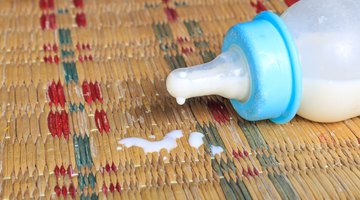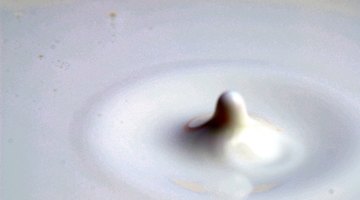Glucose Water for Infants
Glucose is important to a baby’s body for energy and brain growth. A newborn has blood glucose levels that have been passed to him from his mother before birth. The body maintains these levels by breaking down food and converting it into glucose to provide energy.
A healthy baby has no need for glucose water, but low glucose levels can be corrected by increasing food intake or glucose water solution. If you are concerned your baby might need glucose water, consult your pediatrician.
Low Blood Sugar
Infants at risk of low blood sugar, called hypoglycemia, are those born to mothers who have diabetes; babies born with diseases that cause difficulty processing glucose; and babies who become cold, which places stress on the body.
Failure to treat hypoglycemia can cause brain damage and seizures. Often, a blood glucose level is checked following birth. Some physicians use glucose water as a form of treatment for hypoglycemia.
Glucose Water Eplained

Can Newborn Babies Swim?
Learn More
Glucose water is a commercially prepared substance that is mostly water with a small amount of sugar added. Combinations are typically prepared as a mixture of water and either 5 or 10 percent dextrose.
The solution is pre-prepared and ready to feed, and many hospital nurseries have glucose water on hand for treatment of hypoglycemia. Protocols for use of glucose water vary by institution.
Breast-feeding
Some breast-feeding infants may have difficulty latching on to the breast or may be sleepy following birth.
Glucose water is sometimes given to prevent hypoglycemia until a baby establishes breast-feeding. According to Le Leche League International, giving an infant glucose water while learning to breast-feed is contraindicated for the prevention of hypoglycemia. The glucose water elevates blood glucose levels, which may prevent an infant from breast-feeding because he feels satisfied.
Jaundice Treatment

TSH Hormone Levels in Infants
Learn More
Jaundice occurs a few days following birth, when a substance called bilirubin, a byproduct of red blood cell synthesis, builds up in the bloodstream. This causes the skin and the whites of the eyes to turn yellow.
Jaundice is treated by light therapy and increasing feedings to promote bilirubin excretion.
Glucose water used to be a common form of treatment to flush the baby’s digestive system. The California Pacific Medical Center states that using glucose water is ineffective for this purpose, and babies should receive formula first to reduce bilirubin levels.
Administration of Glucose Water
While glucose water may be contraindicated in some circumstances, it can also be a simple form of treatment for stabilizing glucose levels. A doctor may prescribe a set amount of glucose water followed by a blood test to check glucose levels.
Full-term infants may take glucose water by bottle, as it is prepared for this purpose.
Preterm infants may need glucose water administered via nasogastric tube. The glucose water is given directly into the stomach to begin absorption into the bloodstream.











